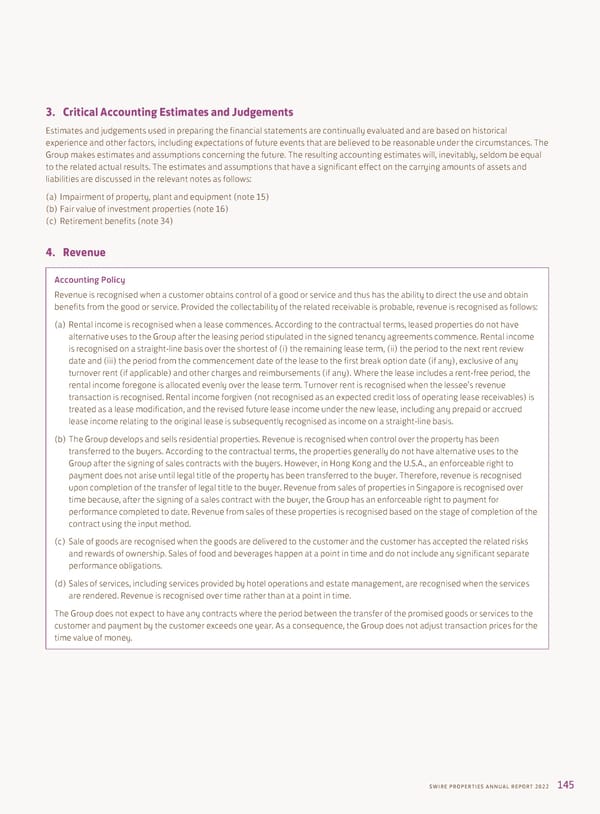3. Critical Accounting Estimates and Judgements Estimates and judgements used in preparing the financial statements are continually evaluated and are based on historical experience and other factors, including expectations of future events that are believed to be reasonable under the circumstances. The Group makes estimates and assumptions concerning the future. The resulting accounting estimates will, inevitably, seldom be equal to the related actual results. The estimates and assumptions that have a significant effect on the carrying amounts of assets and liabilities are discussed in the relevant notes as follows: (a) Impairment of property, plant and equipment (note 15) (b) Fair value of investment properties (note 16) (c) Retirement benefits (note 34) 4. Revenue Accounting Policy Revenue is recognised when a customer obtains control of a good or service and thus has the ability to direct the use and obtain benefits from the good or service. Provided the collectability of the related receivable is probable, revenue is recognised as follows: (a) Rental income is recognised when a lease commences. According to the contractual terms, leased properties do not have alternative uses to the Group after the leasing period stipulated in the signed tenancy agreements commence. Rental income is recognised on a straight-line basis over the shortest of (i) the remaining lease term, (ii) the period to the next rent review date and (iii) the period from the commencement date of the lease to the first break option date (if any), exclusive of any turnover rent (if applicable) and other charges and reimbursements (if any). Where the lease includes a rent-free period, the rental income foregone is allocated evenly over the lease term. Turnover rent is recognised when the lessee’s revenue transaction is recognised. Rental income forgiven (not recognised as an expected credit loss of operating lease receivables) is treated as a lease modification, and the revised future lease income under the new lease, including any prepaid or accrued lease income relating to the original lease is subsequently recognised as income on a straight-line basis. (b) The Group develops and sells residential properties. Revenue is recognised when control over the property has been transferred to the buyers. According to the contractual terms, the properties generally do not have alternative uses to the Group after the signing of sales contracts with the buyers. However, in Hong Kong and the U.S.A., an enforceable right to payment does not arise until legal title of the property has been transferred to the buyer. Therefore, revenue is recognised upon completion of the transfer of legal title to the buyer. Revenue from sales of properties in Singapore is recognised over time because, after the signing of a sales contract with the buyer, the Group has an enforceable right to payment for performance completed to date. Revenue from sales of these properties is recognised based on the stage of completion of the contract using the input method. (c) Sale of goods are recognised when the goods are delivered to the customer and the customer has accepted the related risks and rewards of ownership. Sales of food and beverages happen at a point in time and do not include any significant separate performance obligations. (d) Sales of services, including services provided by hotel operations and estate management, are recognised when the services are rendered. Revenue is recognised over time rather than at a point in time. The Group does not expect to have any contracts where the period between the transfer of the promised goods or services to the customer and payment by the customer exceeds one year. As a consequence, the Group does not adjust transaction prices for the time value of money. SWIRE PROPERTIES ANNUAL REPORT 2022 145
 2022 Annual Report Page 146 Page 148
2022 Annual Report Page 146 Page 148